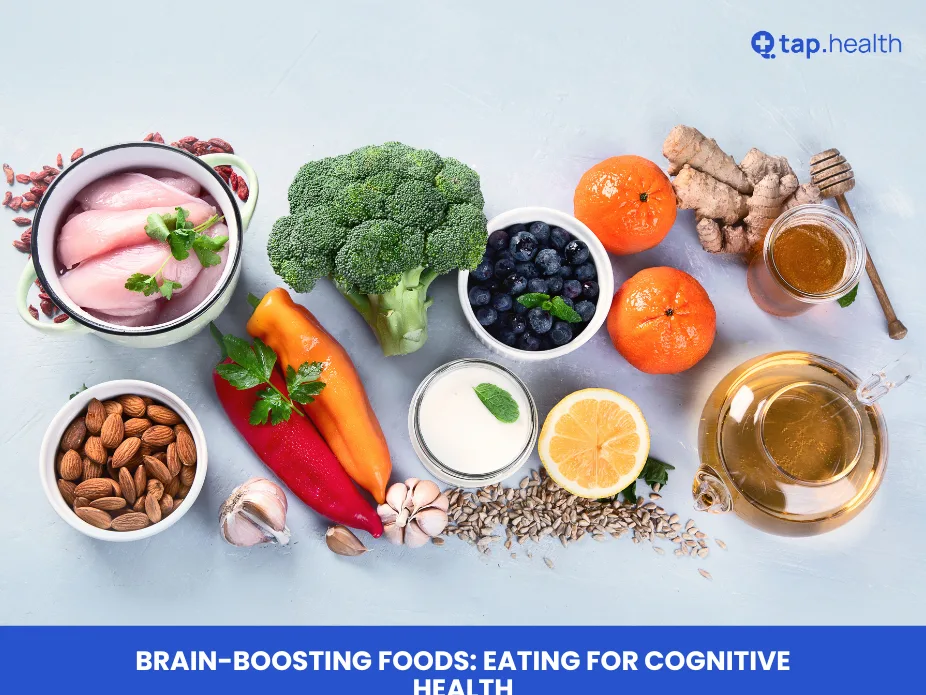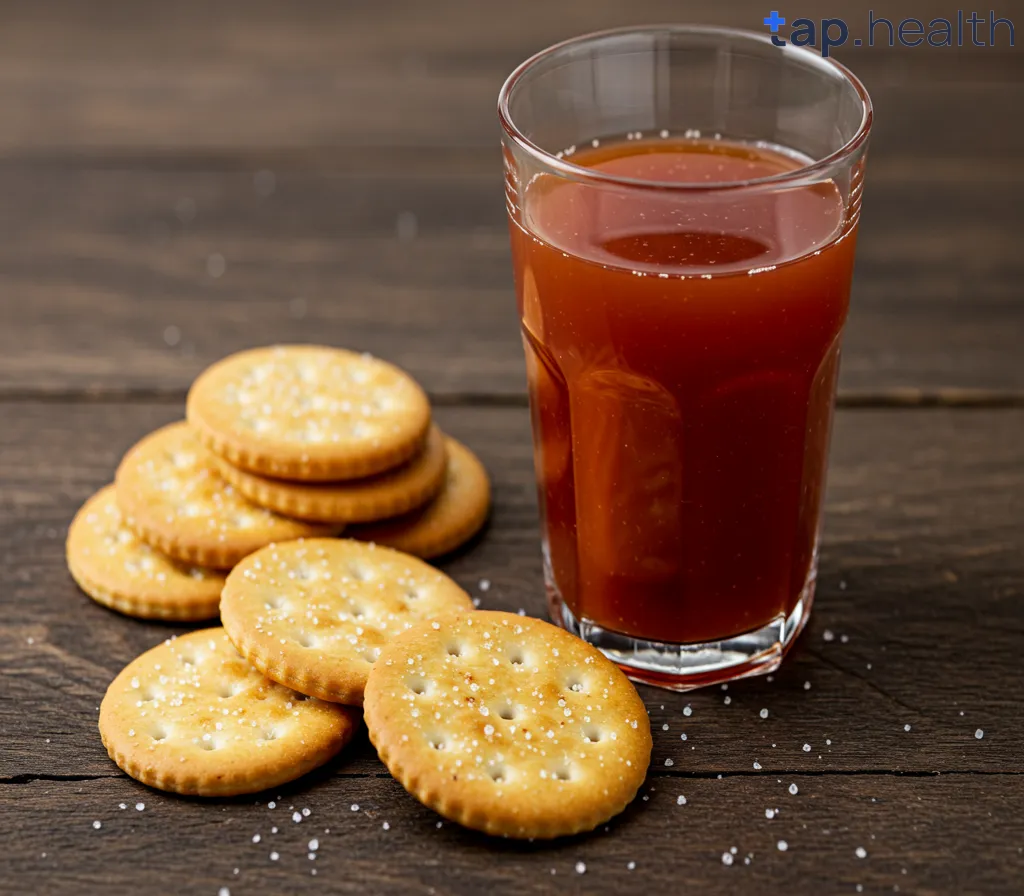Did you know that what you eat plays a crucial role in how well your brain functions? Just like our bodies need fuel to perform at their best, our brains require the right nutrients to maintain sharpness, memory, and focus. Brain-boosting foods are packed with vitamins, minerals, and antioxidants that help protect and enhance cognitive health. These foods help support brain function, prevent cognitive decline, and even improve mood and mental clarity.
In this blog post, we’ll explore some of the best foods to support brain health, explain how they work, and offer practical advice for including them in your diet. Whether you’re a student preparing for exams, a busy professional looking for mental clarity, or just someone interested in maintaining a healthy brain, this guide will help you make smarter food choices for better cognitive health.
Why Eating for Cognitive Health Matters
The brain is one of the most energy-demanding organs in the body. It consumes about 20% of our daily energy intake, so feeding it the right nutrients is essential for optimal performance. Cognitive health refers to mental processes like thinking, learning, memory, and reasoning, all of which can be influenced by our diet.
Eating a brain-boosting diet not only helps improve memory and concentration, but it can also lower the risk of age-related cognitive decline, reduce inflammation, and even support mental well-being. Research suggests that a balanced diet rich in antioxidants, omega-3 fatty acids, vitamins, and minerals can enhance brain function and reduce the risk of neurological diseases like Alzheimer’s and Parkinson’s.
Top Brain-Boosting Foods to Include in Your Diet
Here are some of the best foods you can eat to support and boost cognitive health.
1. Fatty Fish: Rich in Omega-3s
Fatty fish like salmon, mackerel, sardines, and trout are packed with omega-3 fatty acids, particularly DHA (docosahexaenoic acid). DHA is a primary building block of brain tissue and plays a vital role in maintaining brain function. Omega-3s have been shown to improve memory, enhance mood, and even slow the age-related decline of cognitive abilities.
Health Benefits:
- Boosts brain function by providing essential fats for brain cell membranes.
- Supports memory and cognitive function.
- Reduces inflammation in the brain, which is linked to cognitive decline.
How to Use:
Incorporate fatty fish into your meals by grilling, baking, or adding it to salads. Aim to include fish in your diet at least two to three times per week.
2. Blueberries: Antioxidants for Brain Protection
Blueberries are often called a “superfood” for the brain due to their high levels of antioxidants, especially flavonoids. These antioxidants help reduce oxidative stress, which is a key factor in cognitive decline. Studies have shown that regular consumption of blueberries can improve memory, protect the brain from aging, and enhance learning capacity.
Health Benefits:
- Protects brain cells from oxidative damage.
- Enhances short-term memory and cognitive function.
- Reduces inflammation, which may help prevent age-related diseases like Alzheimer’s.
How to Use:
Add blueberries to your morning oatmeal, blend them into smoothies, or simply enjoy them as a snack. They’re also a great addition to yogurt or baked goods.
3. Nuts and Seeds: Brain Fuel in Small Packages
Nuts like walnuts, almonds, and seeds such as chia and flax are packed with nutrients that support brain health. Walnuts, in particular, are rich in omega-3 fatty acids and have been linked to improved cognitive function. Nuts and seeds are also excellent sources of vitamin E, which has been shown to protect the brain from oxidative stress.
Health Benefits:
- Rich in vitamin E, which helps protect the brain from oxidative stress.
- Contains healthy fats, which support brain function and memory.
- Improves cognitive function and reduces the risk of age-related decline.
How to Use:
Snack on a handful of mixed nuts or add seeds to smoothies, salads, or yogurt. You can also sprinkle them on top of your morning cereal or use them in baking recipes.
4. Dark Chocolate: A Sweet Treat for Your Brain
Dark chocolate, especially varieties with at least 70% cocoa, is loaded with antioxidants known as flavonoids. These antioxidants have been shown to improve blood flow to the brain, enhance memory, and even improve mood. Dark chocolate also contains caffeine and theobromine, both of which can provide a temporary cognitive boost.
Health Benefits:
- Improves blood flow to the brain, supporting cognitive function.
- Boosts memory and focus with the help of flavonoids.
- Promotes mood enhancement by stimulating endorphin production.
How to Use:
Enjoy a small piece of dark chocolate as an afternoon snack, or melt it into hot milk for a comforting drink. You can also use it in baking or add cocoa powder to smoothies for a brain-boosting treat.
5. Leafy Greens: Nutrient-Rich for Brain Health
Leafy greens like spinach, kale, and broccoli are packed with vitamins, minerals, and antioxidants that promote brain health. These vegetables are high in vitamin K, lutein, folate, and beta carotene, which support cognitive function, protect against brain aging, and may help improve memory.
Health Benefits:
- Rich in vitamins and minerals that support cognitive function.
- Improves memory and protects against age-related cognitive decline.
- Reduces oxidative stress, protecting the brain from free radical damage.
How to Use:
Add spinach or kale to salads, smoothies, or omelets. You can also sauté them with olive oil and garlic for a simple and delicious side dish.
6. Turmeric: The Golden Root for Cognitive Health
Turmeric is a powerful spice containing the active compound curcumin, which has potent anti-inflammatory and antioxidant properties. Curcumin has been shown to cross the blood-brain barrier, where it helps to reduce inflammation, boost the production of new brain cells, and improve overall cognitive function.
Health Benefits:
- Reduces brain inflammation, which is linked to cognitive decline.
- Boosts memory and enhances learning capacity.
- Promotes the growth of new brain cells by increasing brain-derived neurotrophic factor (BDNF).
How to Use:
Add turmeric to curries, soups, or stews. You can also make “golden milk” by combining turmeric with warm milk and a pinch of black pepper for enhanced absorption.
7. Avocados: Healthy Fats for a Healthy Brain
Avocados are an excellent source of monounsaturated fats, which help improve blood flow to the brain and support brain health. They are also rich in vitamin K and folate, both of which are essential for memory function and cognitive health.
Health Benefits:
- Improves blood flow to the brain, supporting cognitive function.
- Rich in healthy fats, which help nourish the brain.
- Supports memory and learning with high levels of vitamin K and folate.
How to Use:
Add avocado slices to salads, toast, or sandwiches. You can also blend them into smoothies or make a creamy guacamole dip.
Real-Life Scenarios
Scenario 1: The Busy Professional
Sarah works in a fast-paced office and is constantly juggling multiple tasks. To boost her focus and productivity, she incorporates brain-boosting foods into her diet. For breakfast, Sarah has a smoothie with spinach, blueberries, chia seeds, and Greek yogurt. For lunch, she enjoys a salad with grilled salmon, avocado, and walnuts. At her desk, Sarah keeps a small stash of dark chocolate and almonds for a brain-boosting snack. Over time, she notices improvements in her memory, focus, and overall mental clarity.
Scenario 2: The Student Preparing for Exams
Alex is a college student gearing up for final exams. To give his brain the best chance for success, he adjusts his diet to include brain-boosting foods. His breakfast consists of whole-grain toast with avocado and a boiled egg. For lunch, he enjoys a bowl of quinoa with broccoli, salmon, and a handful of almonds. Alex drinks green tea throughout the day to stay hydrated and alert. As exam day approaches, he feels more confident in his ability to retain information and stay focused during his studies.
Expert Contributions
Dr. Lisa Mosconi, a neuroscientist and author of “Brain Food,” explains, “Nutrition plays a significant role in brain function and cognitive health. A diet rich in whole foods, healthy fats, and antioxidants can help prevent cognitive decline and promote brain health well into old age.”
Source: Brain Food by Dr. Lisa Mosconi
FAQs
1. What is the best food for memory?
Foods like blueberries, fatty fish (salmon, mackerel), and walnuts are particularly known for their ability to improve memory. These foods are rich in antioxidants and omega-3 fatty acids that support brain health and cognitive function.
2. Can eating healthy foods improve focus?
Yes, eating a diet rich in healthy fats, antioxidants, and omega-3s can improve focus. Foods like avocados, dark chocolate, and leafy greens support blood flow to the brain, which can enhance concentration and focus.
3. How can I add more brain-boosting foods to my diet?
Incorporate brain-boosting foods into your meals by adding fatty fish to your lunch, snacking on nuts and seeds, and enjoying a smoothie with blueberries, spinach, and chia seeds for breakfast. Aim to make these foods a regular part of your diet for maximum cognitive benefits.
References:
- Harvard Health Publishing. “The Top Brain-Boosting Foods.” Link to Harvard Health
- Mayo Clinic. “What Are Omega-3 Fatty Acids?”



